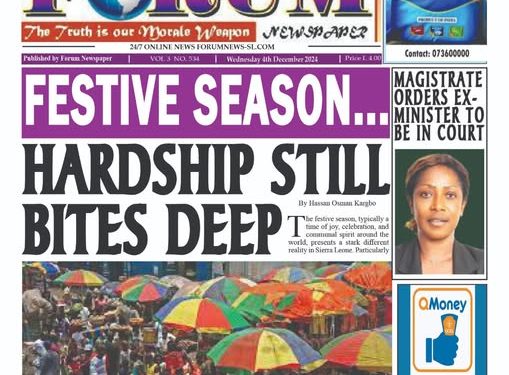By Hassan Osman Kargbo
The festive season, typically a time of joy, celebration, and communal spirit around the world, presents a stark different reality in Sierra Leone. Particularly in the capital, Freetown, and the surrounding regions, economic challenges transform what should be a season of cheer into a period of hardship for many families.
In theory, the festive season is an occasion for gathering, feasting, and exchanging gifts; but in Sierra Leone, it often highlights the economic disparities and struggles faced by a significant portion of the population. With a history marked by civil war, political instability, and economic fluctuations, the country grapples with high unemployment rates, limited access to basic services, and pervasive poverty.
During the festive season, many families struggle to provide essentials, let alone the luxuries that define the holiday spirit. Prices of goods typically soar during this time, exacerbated by supply chain issues and market inflation. Basic food items such as rice, palm oil, and meat become increasingly expensive, placing a strain on household budgets. With many families already living on the brink, the added financial burden during the festive season can lead to severe hardship.
Moreover, the vast majority of the population depends on informal employment, which is often inconsistent and insufficient. As a result, many individuals find themselves unable to secure the necessary funds to participate in festive traditions or purchase gifts for loved ones. The once joyous act of gift-giving becomes a reminder of economic inequities, leading to feelings of despair and hopelessness among those who cannot afford to celebrate in the ways they desire.
Access to healthcare and education further compound such struggles. During the festive season, the urgency for health services generally increases, whether due to common illnesses or accidents related to celebrations. Unfortunately, with underfunded facilities and a shortage of medical supplies, many families are left to navigate challenges without adequate support. Similarly, the prospect of sending children back to school after the holidays can loom large, as many families worry about the financial obligations tied to school fees and supplies.
In rural areas, the hardship become even more pronounced. Infrastructure deficits mean many citizens lack reliable access to markets or basic utilities. Such an isolation can lead to increased food insecurity, further aggravating the struggle during the festive season. Whilst traditional celebrations in villages can still be vibrant and full of cultural significance, the backdrop of economic hardship makes such events bittersweet.
However, amidst the challenges, the resilience of the Sierra Leonean people shines through. Communities often come together to share resources, whether through communal cooking or collective celebrations. Such acts showcase the strength of social bonds and the human spirit, demonstrating that even in times of adversity, there is a determination to find joy and support one another.
Ultimately, while the festive season in Sierra Leone is marred by hardship, it also reveals the unyielding spirit of its people. The contrast between scarcity and resilience serves as a poignant reminder of the ongoing struggles faced by many, with hope that in future seasons, the joys of the festive period will be more accessible to all.











